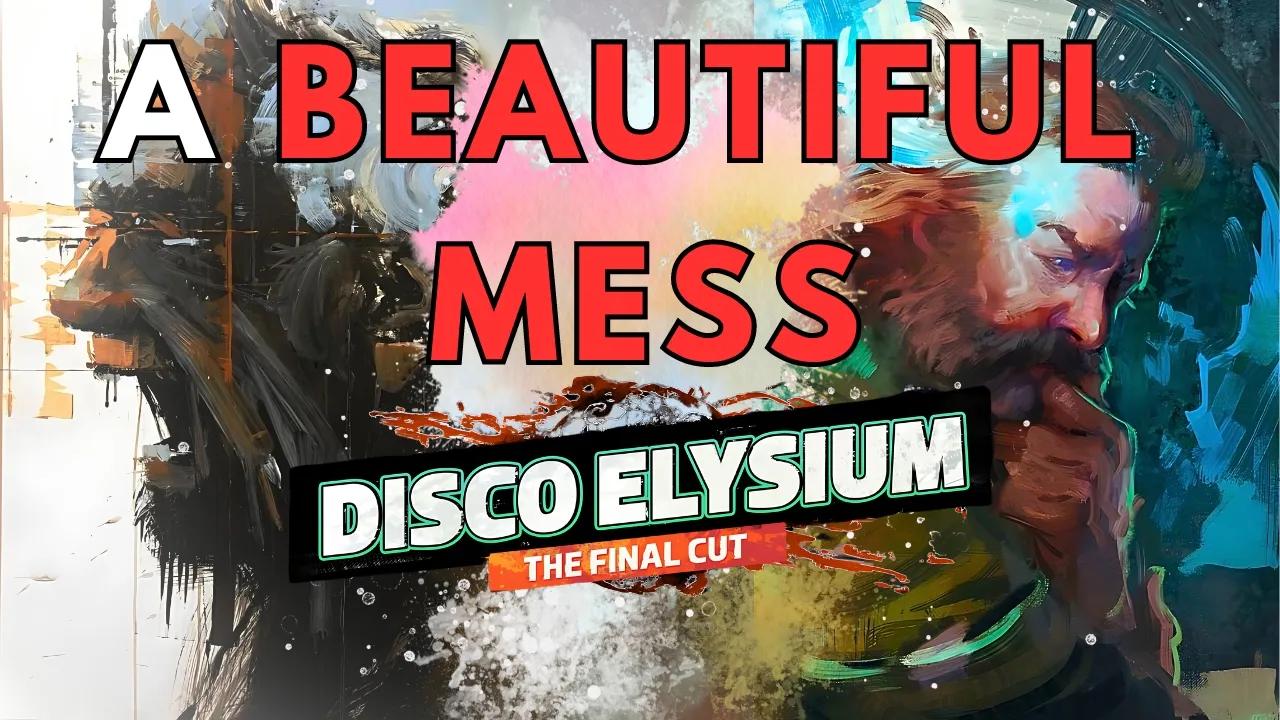
TL;DR
Disco Elysium is an intricate game that combines a rich, noir aesthetic with deep philosophical themes and complex character development. The protagonist, Harry, embodies both flaws and handicaps that not only drive the narrative but also enhance the player’s emotional engagement. Through Harry’s journey, the game explores heavy topics like addiction, mental health, and the impact of one’s past, proving that a beautifully flawed character can create a compelling story.
Introduction
Disco Elysium is a strikingly unique game, celebrated for its abstract art style, profound themes, and remarkable writing. It immerses players in a rich, noir world filled with moral ambiguity, where a detective attempts to solve a murder. While the concept of a morally grey detective isn’t new, Disco Elysium manages to elevate this archetype through its intricately crafted characters and their personal journeys. This leads to the question: how does such a simple plot become one of the most engaging and entertaining stories ever told?
The answer lies in the complexity of its characters, particularly the protagonist, Harry. Disco Elysium excels at creating multifaceted characters who are integral to the narrative, highlighting the importance of character-driven storytelling. At the heart of every compelling narrative is the interplay of characters and conflict, which Disco Elysium navigates masterfully.
The Beauty of Flaws and Handicaps
In storytelling, characters must grapple with conflicts that arise from their flaws and handicaps. These elements can serve as catalysts for growth, change, and resolution, allowing for a more profound exploration of themes and character arcs. Flaws are internal traits that a character has the potential to change, while handicaps are external limitations that the character cannot control.
For instance, Harry’s journey in Disco Elysium is defined by both. He wakes up in a trashed hostel, suffering from amnesia and a severe hangover, with no recollection of his past or his identity. This initial state serves not only as a plot device but also symbolizes the larger themes of the game, such as the impact of self-destruction and the struggle to confront one’s history.
Complex Characters Drive the Narrative
Characters are the heart of storytelling, and Disco Elysium thrives on its rich character development. Each character embodies unique traits, flaws, and conflicts that contribute to the overarching narrative. The game’s protagonist, Harry, is a prime example of this complexity. His character is not merely a vessel for the player’s choices but a fully realized individual with depth and nuance.
Harry’s struggles with addiction, depression, and a tumultuous past create a dynamic internal conflict. These elements are not just obstacles to overcome; they shape his interactions with the world and the people around him. The game’s writing captures the essence of Harry’s character, making his flaws relatable and humanizing him in the process.
The Role of Amnesia
Harry’s amnesia is a significant handicap that influences his journey. While it initially appears to be a simple plot device, the implications of his memory loss are profound. It forces players to grapple with the notion of identity and the impact of one’s past on the present. As Harry seeks to solve the murder, he is also on a quest to rediscover himself, a journey that mirrors the larger themes of memory, loss, and redemption.
The use of amnesia in Disco Elysium is a masterclass in storytelling. Unlike other narratives where amnesia serves merely as a way to introduce players to the world, Disco Elysium weaves this element into the fabric of its themes. Harry’s quest for self-understanding is intertwined with his investigation, allowing players to explore deeper philosophical questions about the nature of identity and the permanence of the past.
 What Poetry Feels Like
What Poetry Feels LikeFlaws as Amplifiers of Conflict
Flaws and handicaps serve to enhance the central conflicts in the narrative. They create tension and drive the story forward, compelling characters to confront their inner demons and external challenges. Harry’s flaws—impulsiveness, addiction, and emotional instability—create a rich tapestry of conflict that players must navigate.
For example, Harry’s addiction is not merely a background detail; it is a defining aspect of his character that affects every decision he makes. The game does not shy away from the complexities of addiction, presenting it as a multifaceted issue rather than a simplistic flaw to overcome. This nuanced approach allows players to engage with Harry’s struggles on a deeper level, fostering empathy and understanding.
The Intersection of Character and Theme
Disco Elysium’s character development is intricately linked to its themes. The game explores heavy topics such as addiction, mental health, and the weight of one’s past, all through the lens of Harry’s experiences. These themes are not presented as abstract concepts but are embodied by Harry and his journey.
The game’s exploration of addiction, for instance, is not just a narrative device; it serves as a commentary on the human experience. Harry’s struggles reflect real-world issues, making his journey resonate with players on a personal level. The game invites players to confront their own perceptions of addiction and mental health, encouraging a deeper reflection on these topics.
Creating Relatable Characters
The relatability of characters like Harry is a crucial aspect of what makes Disco Elysium resonate with audiences. His flaws and handicaps mirror the complexities of real life, allowing players to see themselves in his struggles. This connection fosters empathy, making Harry’s journey more impactful.
In modern storytelling, characters that are overly virtuous or lacking in complexity often feel unrelatable. Disco Elysium subverts this trend by presenting a protagonist who is deeply flawed and imperfect. This approach not only makes Harry more relatable but also enhances the emotional stakes of the narrative. Players are invested in his journey, rooting for him to confront his demons and find redemption.
The Impact of the Game’s Setting
The world of Disco Elysium is as rich and complex as its characters. The fictional city of Revachol serves as a backdrop for Harry’s journey, reflecting his internal struggles and the larger societal issues at play. The political climate, social norms, and philosophical beliefs of Revachol create an immersive environment that deepens the narrative.
The game’s setting is not merely a backdrop but a character in its own right. It influences the choices Harry makes and the challenges he faces. The interplay between Harry’s personal journey and the world around him adds layers of complexity to the narrative, making it all the more engaging.
Conclusion: The Beautiful Mess of Disco Elysium
Disco Elysium is a beautiful mess, a game that intertwines complex character development with profound themes and immersive storytelling. Harry’s journey, marked by his flaws and handicaps, invites players to explore deep philosophical questions while engaging with a compelling narrative.
Through its rich writing, stunning art style, and nuanced exploration of heavy topics, Disco Elysium stands as a testament to the power of storytelling. Characters like Harry remind us that perfection is not the goal; instead, it is the journey of self-discovery, the confrontation of one’s past, and the pursuit of understanding that truly matters. In a world filled with complexities, Disco Elysium shines as a beacon of hope and a celebration of the beautifully flawed human experience.
Original channel: https://www.youtube.com/channel/UC9R_q0yA1n6KpbXtIxcFGtg

 Grab my poetry book, 'we're all just wanderers in the end' Here
Grab my poetry book, 'we're all just wanderers in the end' Here AD: Your Book Finally Written...
AD: Your Book Finally Written...